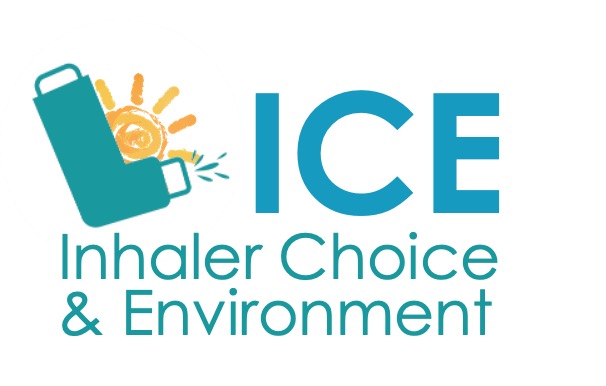The impact of inhaler choice on climate change and personalised healthcare
The Environement, Epidemiology and Airways Working Group is conducting a research project looking at Inhaler Choice and the Environment (ICE).
Objective of ICE
This research will provide expert opinion and consensus of physicians and health care workers on:
- Costs to environment: The impact of inhaler choice and switching inhaler delivery system on climate change, as well as short-term vs long-term solutions for reduction of impact.
The research will also gather information from patients on:
- Personal impact: The impact of inhaler choice / changing medication that has affected their personalized healthcare plan and inhaler use.
Rationale
Medications for asthma and COPD are mostly administered using inhaler devices. Inhalers are crucial to managing daily symptoms, acute emergencies and chronic disease. Most of the current inhaler devices available provide therapy using one of three drug delivery systems: dry powder inhalers (DPI), metered-dose inhalers (MDIs +/- spacers/holding chambers, and breath-actuated MDIs) and soft mist inhalers (SMIs).
The potential benefits and drawbacks of inhaler delivery systems and their impact on patient care is well documented, but there has been limited discussion on the contribution of inhaler choice to climate change and personalised healthcare.
This research aims to gather patient-centric expert opinion to deliver consensus on the impact of switching inhaler type on climate change and the suggestion of green alternatives to switching inhaler types; as well as measure the impact of switching on patients and their personalised healthcare plan. Extra focus will be given to switching inhaler type for non-medical reasons (i.e. based on policy change, rather than patient health requirements); and offer perspective on driving inhaler development for carbon reduction. It will also provide an update of the current discussion in the literature on the impact of inhaler choice to provide support to the consensus.
Methodology and Outputs
The study will be carried out in 3 parts leading to 3 outputs:
Part A: International data collection using two questionaires
The aim of the questionnaires is to identify key needs, opinions, priorities and values in inhaler choice and the potential impact of switching delivery systems on patient care. Patients and healthcare professionals will also be asked about greener alternatives and whether they are or will be used in practice. The scope of questions for the survey will be to gauge opinion on:
- Characteristics – To gather general information on patient (such as demographics, diagnosis, inhaler switch and inhaler brand) and HCP (such as their region of work).
- Personalised healthcare / inhaler choice – To identify satisfaction, opinion and considerations of patients and HCPs on their choices in inhalers/healthcare plan
- Inhaler satisfaction - To ascertain patient confidence and satisfaction with their (new) inhaler
- Climate change – To gain insight into awareness and attitudes towards inhaler impact on climate change, green inhaler alternatives and green alternatives to switching inhaler (such as recycling).
These results will inform the survey design for the Delphi exercies (see below). The results of part A will be analysed and compared to the literature, leading to the development of a manuscript for submission to a peer-reviewed journal.
Part B: Delphi exercise
A modified Delphi survey will be designed based on the results from the patient/HCP questionnaires and sent to participants to identify and prioritise key issues in inhaler choice in personalised health care, changing delivery systems and development of green alternatives. Focus will be directed to raising key themes and questions of the impact of inhaler choice on climate change and patient care.
The second round of the Delphi exercise will aim to reach consensus on the needs identified in phase I Delphi and evidence provided by the survey responses. Evidence from the Delphi surveys will be reviewed and interpreted, and priorities among the groups will be compared, identifying common priorities and commenting on any discrepancies.
The results from the Delphi will be analysed and compared with the literature, and a paper for submission to a peer-reviewed journal will be developed.
Part C: REG opinion piece
The final output of this study will be a structured expert consensus/opinion piece which offers a clear concise statement on the impact of inhaler choice/switch and policy on both the environment and patient care and potential alternative solutions to balancing the needs of the patient and the needs to reduce environmental cost in short- and mid-term vs long-term. The consensus will include recommendations for quality improvement driving carbon reduction and development of low carbon propellants to avoid policy-based inhaler switch as opposed to patient needs. To be submitted for publication in peer-reviewed journal.
Study Steering Committee
Omar Usmani (Chief Investigator)
Sinthia Bosnic-Anticevich
Nicolas Roche
Status
The surveys for Part A of this study are now closed and the data is being analysed. Thank you to all the patients and HCPs who participated in the survey.
Part B will rollout out in Summer/Autumn 2022
If you would like further information, please contact Graham (graham@regresearchnetwork.org).
Study registrations
ENCePP number: EUPAS39494
Funding
AstraZeneca
Boehringer Ingelheim
Chiesi
Kindeva


